History is now in the making in Belarus, a country of 9.4 million people located in the center of Europe. “Voice of Belarus,” a volunteer-run website, translates, creates and distributes the latest press reports, analyses, and news about the developing situation.

When people stood up to defend their vote in a blatantly rigged presidential election on 9 August 2020, the authorities responded with a wave of unprecedented violence, leaving at least ten dead, hundreds wounded and more than 30,000 detained – all likely an undercount as the government terrorizes citizens and hides the true scale of the oppression.
This brutal response to peaceful protests, along with the state’s refusal to investigate police crimes and election fraud, sent hundreds of thousands of law-abiding Belarusians to the streets in a quest to topple “the last European dictator” and win justice for the nation.
This volunteer-run project documents what’s going on in the country via daily bulletins and translation of media reports from Belarus into several languages. In these decisive times, our nation yearns for global solidarity to support Belarusians in our fight for freedom. So read on, spread the word and stand with us.
Your support is invaluable and we are grateful.
Thank you!
Follow us: YouTube, Telegram, Instagram. Check out our partner pages on Facebook, Twitter, Telegram, and this Facebook group for news & updates.
Contact us: all inquiries
On this page:
- What you should know
- Why you should care
- What you can do
- Belarus: what and where is it?
- The project, the team
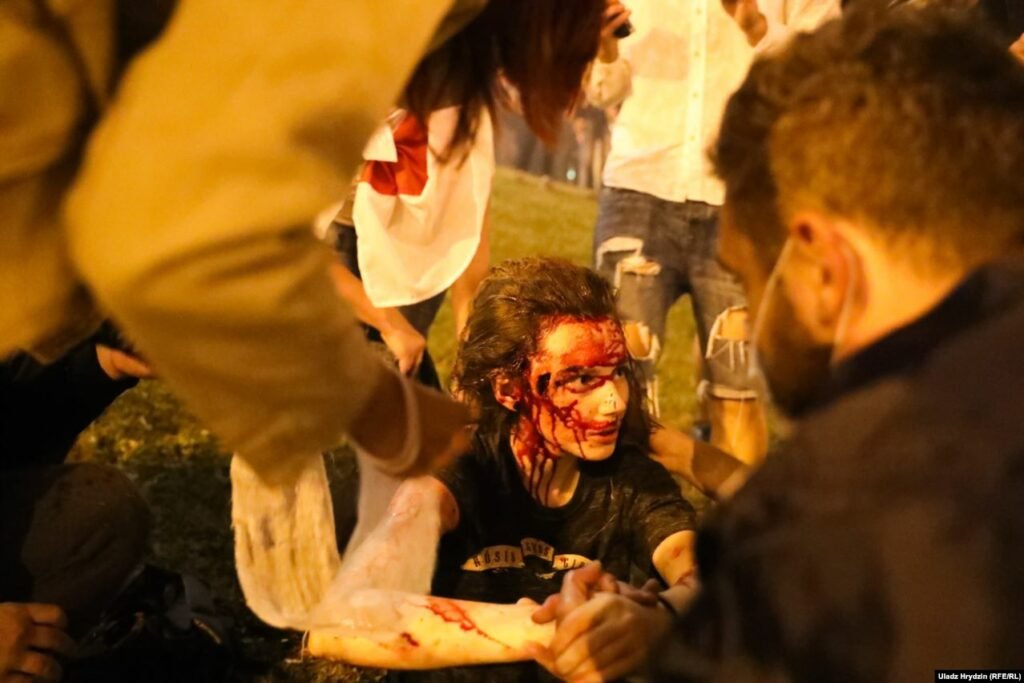
Source: Uladz Hrydzin, Radio Svaboda
What you should know
Alexander Lukashenko has ruled Belarus by questionable means for 26 years since becoming president in 1994, taking power soon after the former Soviet Republic gained independence in 1991. Though many prior elections have likely been rigged, this year Lukashenko crossed a red line for many Belarusians. They hoped to finally oust the so-called president in the August election. Instead, he “won” with 80% of the vote. The government clearly faked the results according to numerous accounts: even incomplete independently-gathered polling data shows clear falsifications at every third polling station.
This year’s election campaign felt like a typical one in Belarus as the authorities forced some potential contenders out of the country and imprisoned two other popular candidates. It was Sviatlana Tsikhanouskaya, the wife of one of those jailed, who beat Lukashenko in the election this year, at least according to independent accounts.
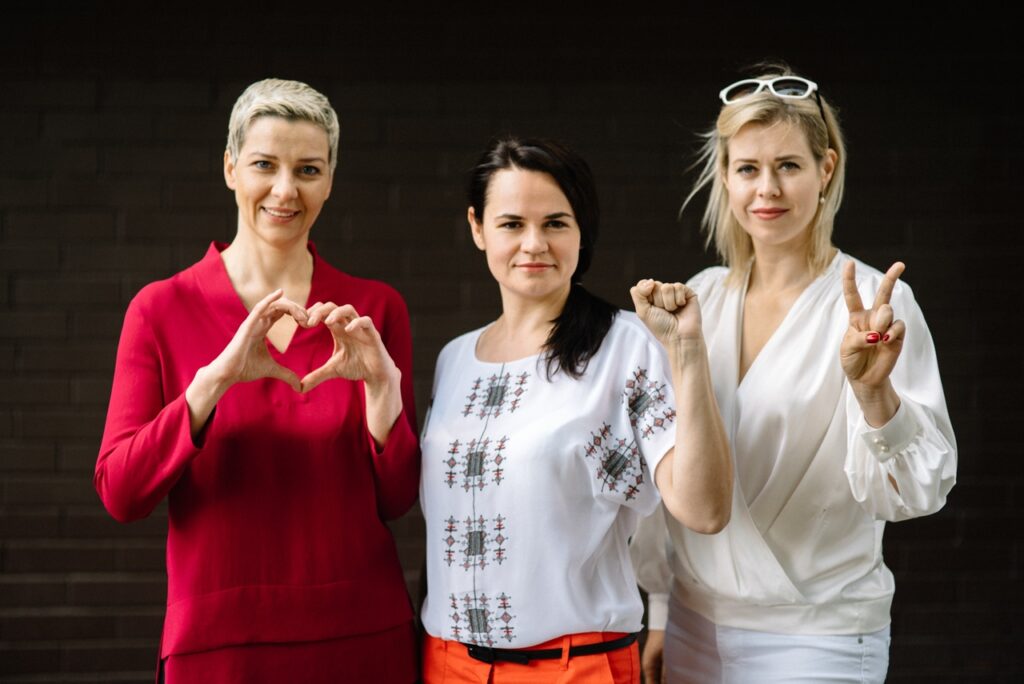
Source: facebook.com/viktar.babaryka
Sviatlana Tsikhanouskaya’s official tally is a meager 10.1% compared to Lukashenko’s 80.1%, but these figures were most likely made up by Lukashenko’s ally Lidziya Yarmoshyna, who has run the Central Election Commission for 24 years. Even with famously opaque elections, this year’s manipulations were easy to notice. There is no way to establish the real result as the authorities have destroyed the ballots and related district-level documentation.
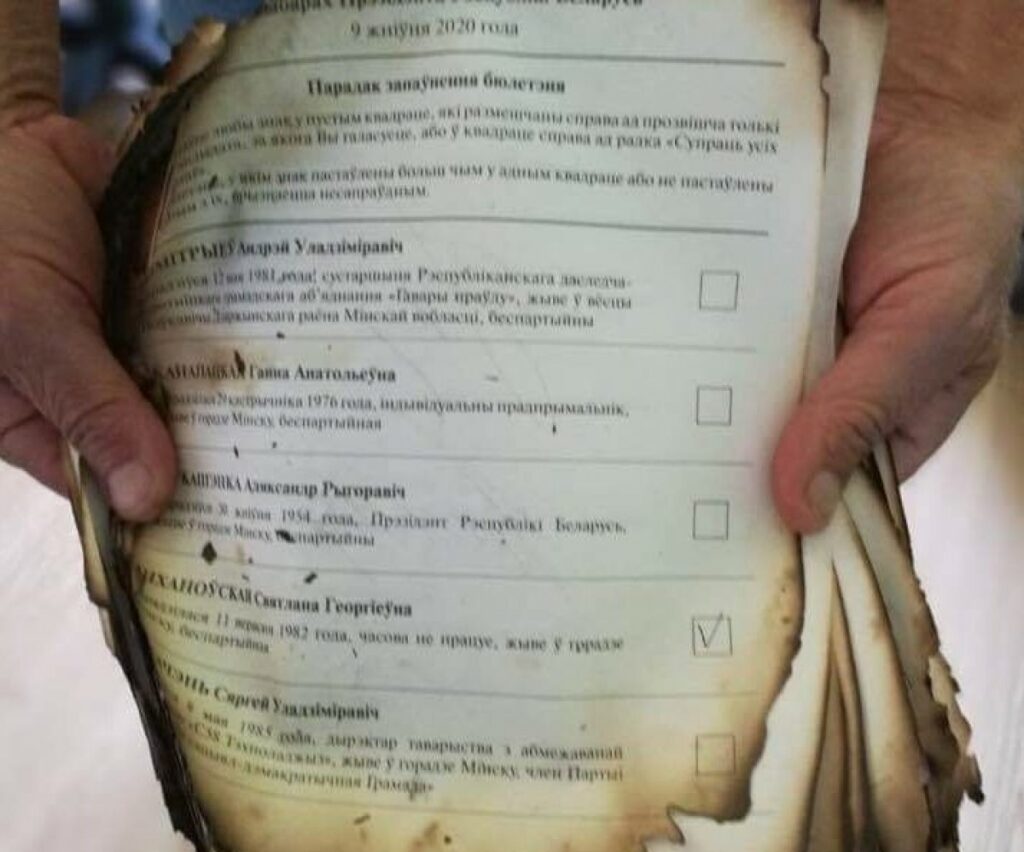
Source: t.me/belamova
Despite the ban on non-government exit-polls, the absence of international observers and the near-ban on local independent observers (some were detained), the pile of evidence kept growing. Evidence ranged from direct, such as audio recordings and witness accounts, to indirect, through precinct-level analysis of results and ballot photos. The latter was gathered via a complex analysis project comparing spotty official precinct-level data with the real results from the ballots – citizens took photos of their filled-in ballots and submitted the images to the project.
The election results report from the “Voice” online platform, based on 500K+ ballot and voting protocol photos
Tsikhanouskaya’s team submitted an appeal backed by 25 folders of evidence detailing breaches of the law over the election campaign period, only for the Supreme Court to shrug it off. Acting president Lukashenko said there will be no new elections “until you kill me.”
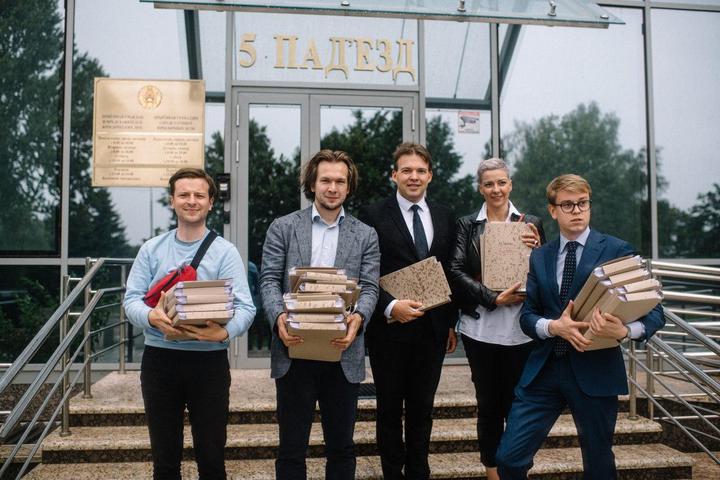
Source: TUT.BY
In response to the falsifications, Belarusians took to the streets to protest. They call their protests “the most peaceful in the world.” In fact, most damage to infrastructure so far has not been inflicted by protesters but instead by the police. Protesters have literally been picking up trash after themselves and taking off their shoes when standing on benches, which starkly contrasts with the extreme levels of police brutality: harsh beatings, use of rubber bullets, flash grenades and water cannons.
So far, the only documented deaths have been at the hands of the authorities as protesters took to the streets in the hundreds of thousands. At least four persons have been officially confirmed dead after being shot or detained by the police, and two men allegedly “committed suicide” under suspicious circumstances.
Source: vk.com/bondarenko_roman_av
In one of the most egregious examples, Raman Bandarenka, 31, was killed by either plainclothes police or police-affiliated thugs. On the night of 11 November he went out to ask why unknown persons were cutting opposition flag-colored ribbons near his apartment building. Raman was attacked by thugs in black, who beat him up and took him to a police station. From there, he was taken to an emergency room with a severe head trauma. Doctors couldn’t save his life.
Following Raman Bandarenka’s death, a journalist and a doctor were detained on criminal charges, but not because they’d had anything to do with the murder. They were detained for confirming and disclosing that Raman didn’t have any alcohol in his blood on the night of his death – contrary to a statement made by Lukashenko accusing Raman of intoxication in a likely attempt to disparage him. So far, zero criminal cases have been launched regarding Raman’s murder.
Without any public official inquiries into the murder, various media outlets reported that plainclothes raids, such as the one in which Raman was killed, had been spearheaded by Lukashenko’s top aides. Among them were his press secretary, Natallia Eismant, and his hockey team’s head coach, Dmitry Baskov. Baskov was allegedly identified on footage from the crime scene on 11 November.
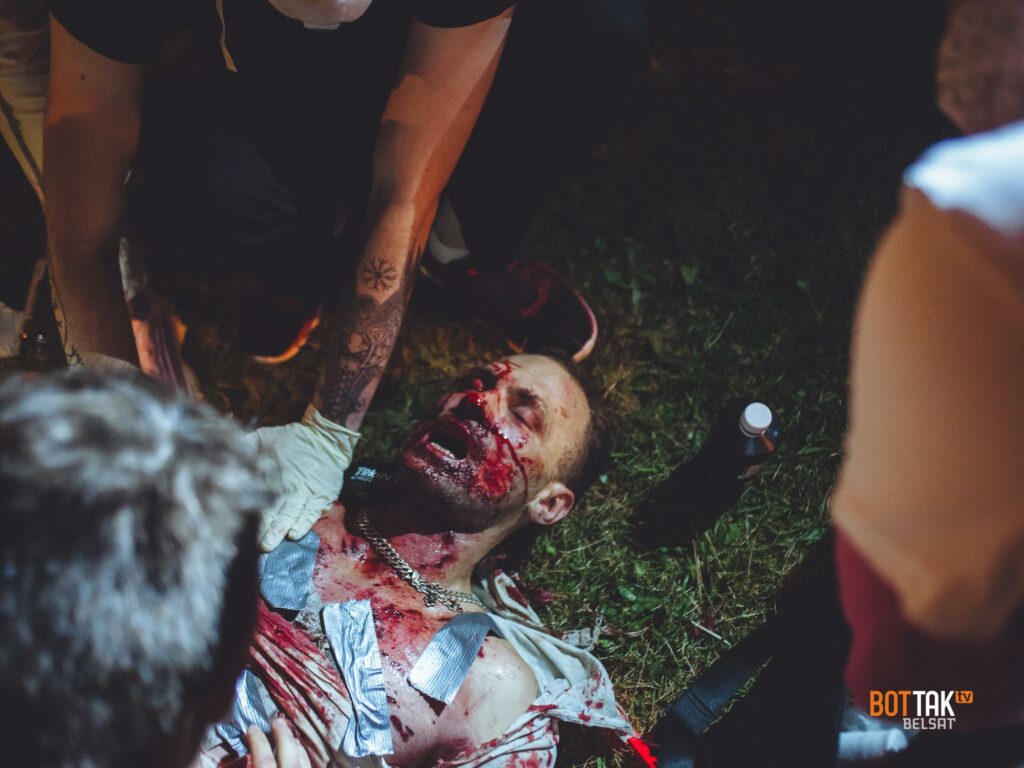
Source: Aliaksandr Vasiukovich, vot-tak.tv / belsat.eu
Of the more than 30,000 detained since 9 August, at least 1,406 were injured by the police, including documented victims of rape attempts. People waiting outside the prisons reported and recorded inhuman cries of the detained. Doctors who treated victims said they were shocked by the brutality. Some doctors then joined the protests and were also detained and injured; many got laid off or were forced to flee the country.
United Nations human rights experts reported about 450 documented cases of torture. More than 1,000 complaints have been filed with Belarusian authorities, but zero criminal investigations have been initiated. At the same time, the police opened more than 900 criminal cases against Belarusians who participated in protests. Viasna Human Rights Centre considers 167 detained persons as political prisoners.
Source: TUT.BY
One of the many horrifying cases of police brutality involves a 16-year-old minor named Timur, who allegedly attacked a police car. After being tortured while detained by the police, he was hospitalized and put into a medically-induced coma. He recovered but was then imprisoned, interrogated again and then re-hospitalized. Timur said that policemen had thrust a baton deep into his throat and kicked it, shoved the baton into his eyes and threatened to blind him, and repeatedly used the baton to strike his heel bones. Doctors recorded a fracture of the upper jaw, diagnosed a closed craniocerebral trauma, a palate torn with a baton, and numerous bruises on the body.
Source: VICE News
While the open violence subsided and the authorities came to terms with hundreds of thousands of peaceful protesters taking to the streets every week, covert oppression and suppression intensified. The authorities detained several protest and strike leaders countrywide, intimidated others, and pushed some out of Belarus. Sviatlana Tsikhanouskaya – the likely real winner of the election – was literally taken to the Belarusian-Lithuanian border by the Belarusian KGB and forced to leave the country. She wouldn’t comment on the details, though many connect her silence to threats against her children and her husband, who is still being kept hostage by the authorities under what many believe are fabricated charges.
Source: The New York Times
Opposition leader Maria Kalesnikava was “snatched from the street” in downtown Minsk by unidentified people in broad daylight. These later turned out to be KGB agents – Belarus’ secret police. After an unsuccessful attempt to forcefully “expel” her to Ukraine, during which she tore up her passport and jumped out of the car to remain in Belarus, Kalesnikava has been detained on charges of “public calls to take over authority or violently overthrow the constitutional order.”
Most of Tsikhanouskaya’s allies have been forced out of the country as well, especially since Lukashenko launched several criminal cases against them. In an unprecedented move, Belarus prohibited a citizen – Archbishop Tadeusz Kondrusewicz, a Catholic Church leader who expressed support for the protests – from entering the country (he was only admitted back on 24 December, after the pope intervened).
Leaving the country has also become an issue: since 21 December, Belarusians have been barred from leaving the country by land – in order to curb the spread of COVID-19, according to state authorities.
Managers of US tech company Pandadoc were detained on apparently made-up charges after the company’s CEO offered support to defecting members of the police forces. Many other businesses were harshly punished for disobedience and were forced to shut down.
Not only the leaders of the opposition but also passers-by are being terrorized by the police. It’s not surprising in Belarus these days to see groups of masked people in black with no identifying markings snatching people on streets and intimidating witnesses, or even breaking storefronts with their batons.
Since November, the police have also been ravaging residential neighborhoods on weekends as protest marches moved there from city centers. In one outlandish case, the police went door to door, blockading an apartment building to detain those who had paid tribute to the late Raman Bandarenka at a makeshift memorial near his house.
“Sometimes there is no time for law,” Lukashenko said in September when he was introducing a new Prosecutor General to his office. “Stand by me and save the country.”
Russia, China, and several former republics of the Soviet Union did recognize the 2020 election in Belarus. The US, UK, European Union and many other countries did not recognize the election. They condemned the violence and called for dialogue. The United States, European Union and other western countries imposed sanctions for repression and election fraud in Belarus. Lukashenko accused the West of organizing the protests and continuously declined calls for dialogue with the opposition.
Despite mounting external and internal pressure, erratic Lukashenko still manages to hold his position, mainly due to the loyalty and brutality of his security apparatus amid nationwide unrest. With declared support from Russia, his closest economic and political ally, many in Belarus now worry Lukashenko might give up the country’s independence to form a closer union with Russia for a chance to maintain his rule.
The situation is complex and there’s no simple solution on the horizon. Lukashenko is determined to stay in power while the Belarusian people are determined to challenge the status quo. As the situation keeps unfolding, we’ll keep updating you on what’s going on, based on the most comprehensive and diverse media reports from the ground. They’ll give you a much better perspective compared to foreign media reports that often miss important details and background.
* most recent update: 26 December 2020
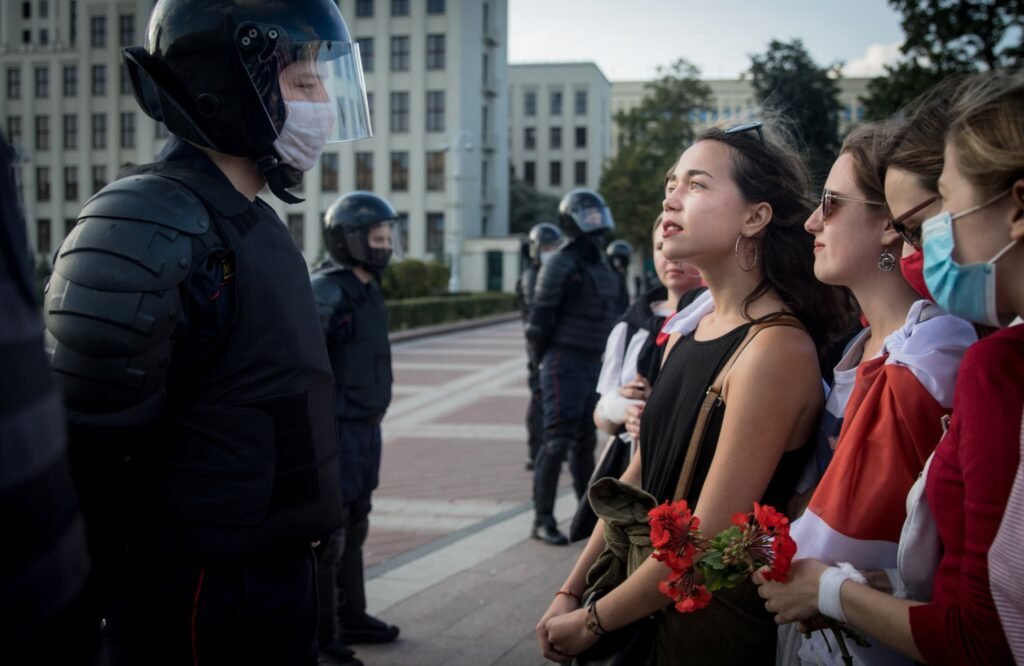
Source: facebook.com/iryna.arakhouskaya
Why you should care
– It is a violent tragedy unfolding in Europe
If you think that people shouldn’t be killed, tortured, or maimed for voicing their opinion and showing dissent peacefully, you should care.
– It’s about democracy and basic human dignity
If you support a nation’s right to change leaders peacefully and democratically through open and fair elections, you should care.
– It’s about geopolitics too: Russia and the West
If you think nations should decide their path for themselves without outside interventions, you should care.
While the protests in Belarus are not pro-Russian or pro-Western, Russia openly supports Lukashenko: the Kremlin has recently approved $1.5 billion in loans and even offered to send its troops across the border “to restore stability”. At the same time, both Moscow and Lukashenko accuse the West of stoking the protests and interfering in Belarusian internal affairs.
What you can do
To help Belarus and Belarusians, please spread the word about the situation and about our project: share our translations and other reports from Belarus, visit our website and follow us on social media (YouTube, Instagram, Telegram; and also Twitter, Facebook, Telegram and this Facebook Group).
Talk about it with your friends and colleagues, and, if you can, to media, bloggers, and elected officials.
Feel free to reach out to us over email if you have specific initiatives in mind or would like to participate in any other way.
Belarus: what and where is it?
Belarus is a beautiful landlocked country of 9.4 million people situated in the geographical center of Europe. Its capital, Minsk, is ranked the 10th-largest city by population in Europe.
The country is slightly smaller than the UK by area and is roughly the size of the US state of Minnesota. Belarus borders three European Union countries (Poland, Lithuania, Latvia) to the west-northwest, Russia to the northeast and Ukraine to the south.
Belarusians (83.7%) comprise the largest national ethnic group in Belarus, followed by Russians (8.3%), Poles (3.1%) and Ukrainians (1.7%). The country has two state languages, Russian and Belarusian. There have been no violent religious or ethnic conflicts in Belarus for more than a century.
A peaceful nation, Belarus lost about a third of its population in WWII.
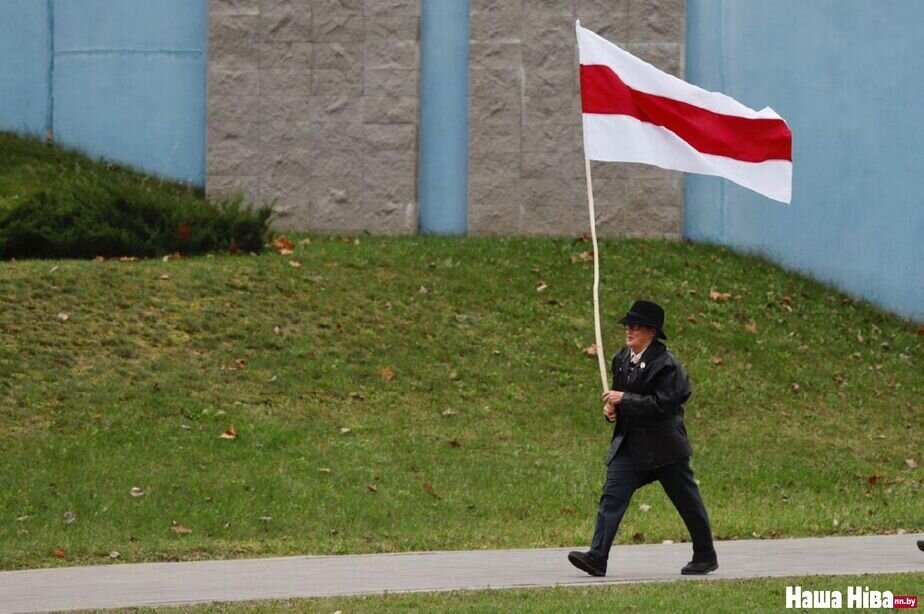
Source: NN.BY
The Belarusian GDP (nominal) was estimated at $63.6 billion for 2020, 75th in the world. Belarus is a member of the Eurasian Economic Community, a regional trade bloc led by Russia, and is uniquely positioned to serve as a transit hub for cargo, oil and gas moving between the EU and Russia. The Belarusian economy relies heavily on state-owned enterprises, mainly in the energy sector (export of refined oil products), as well as agriculture, potash fertilizers and heavy machinery.
Belarus, known in the past for Soviet-legacy machinery, became a regional hi-tech hub, a birthplace of many complex tech products. Several world-renowned digital products were built or co-built in Belarus, such as the Viber messenger app (with more than a billion users worldwide), the World of Tanks game (with more than 160 million players globally) and the MSQRD app, which was bought by Facebook to introduce AR video face filters to Facebook Messenger and Instagram.
More about Belarus:
- Belarus on Wikipedia
- Belarusian Protests 2020 on Wikipedia
- BelarusFeed: News from Belarus in English
- Official state-run website for Belarus
- Visit Belarus
- 12 Words that Explain the Mentality and Culture of Belarus
- Questions and Answers about the White-Red-White Flag
The project, the team
“Voice of Belarus” was born out of the initiative of hundreds of Belarusians from all over the world. Its goal is to create, translate and distribute the latest press reports, analyses, and news from Belarus. We are building a multilingual archive of texts and videos. Each piece of content is hand-picked by experienced journalists and activists on our team to be translated and published.
We have created this central site, VoiceOfBelarus.com, and the YouTube channel Voice of Belarus, as well as the English-speaking Telegram channel Voice of Belarus and Instagram Voice of Belarus.
We partner with the English-speaking Pray For Belarus project, which publishes live feeds about events in Belarus on Facebook, Telegram, and Twitter, as well as other initiatives.
We’d like to thank all of our translators and editors, including:
A. Vaher – DE
Aleksander Navicki – PL
Aleksandr & Nataly Barbantsov/a – ES
Aleksandra Reczuch – PL
Alena Shastakova – ES
Amanda Tan – EN
Anastasiia Manokhina – EN
Andre Lyonnais – FR
Andrej Shadura – EN
Angela Espinosa Ruiz – ES
Anna Klassnaya – IT
Anne Délizée – FR
Anton Paulovich – PL
Artiom Balenok – EN
Danièle S. – FR
Diana Yermakova – FR
Elena Harleman – FR
Elena L Leo – EN
Elena S. – ES
Elizaveta Belous – FR
Hanna Barysevich – PL
Halina Menthe – FR
Hanna P. – DE
Hanna Sliashynskaya – ES
Hanna Shpuntova – ES
Héléna Ariès – FR
Jakob Wunderwald – DE
Juliette Prakapovich – FR
Karalina Saŭka – PL
Kateřina Martinková – CS
Katherine M. – EN
Katie Koche – EN
Lena Borries – DE
Lidia Federica Mazzitelli – IT
Mara Volskaja – IT
Marcin Bartyzel – PL
Marharyta Taraikevich – FR
Maria Maier-Koshel – DE, FR
Martina Pospíšilová – EN
Maryia Chashei – EN
Maryna Belavusava – FR
Mikhail Kavalevich – EN
Mila Iwanowa – DE
Milana Nauen – DE
Oksana O’Neill – EN
Olga Dokukova – ES
Paulina Ibek. – PL
Polina Polovnikova – DE
Svetlana Kulbakova – ES
Sviatlana Piskun Radosław Rusak – PL
Tania Medvedeva – EN
Tatiana S. – DE
Tatsiana Lazouskaya – FR
Vadym Dupanov – CS
Valeryia Sauchanka – FR
Volha Tsimoshyk – IT
Yuliya Schmidt – DE
Yury Kartynnik – EN